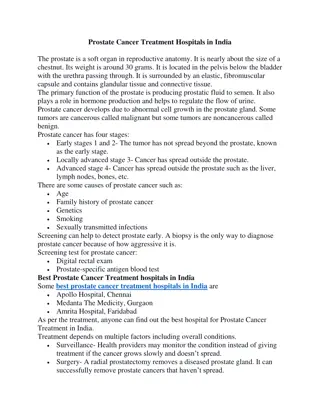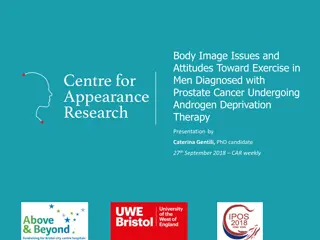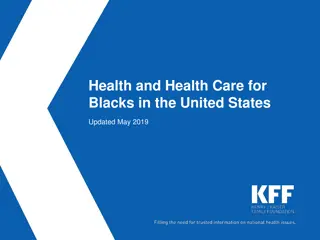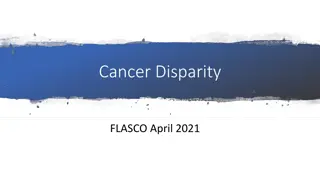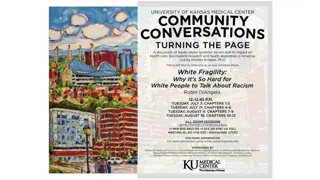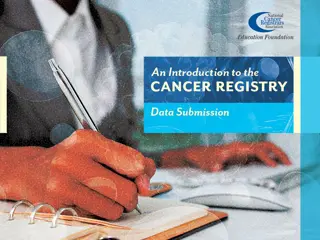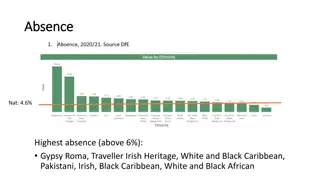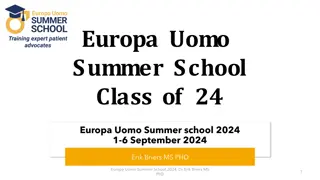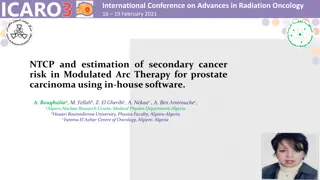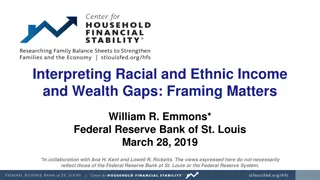Prostate Cancer Disparities: Black Men vs. White Men - A Study by Dr. Renee Reams
Investigating the disparities in prostate cancer among Black and White men, Dr. Renee Reams conducted research highlighting real differences in prostate tumors based on race. RNA sequencing analysis explored possible genetic predispositions in Black men, raising questions about inflammation factors and societal stress. The study also proposes a shift towards collecting ethnicity and ancestry data in health records to improve healthcare outcomes.
Uploaded on Sep 12, 2024 | 0 Views
Download Presentation

Please find below an Image/Link to download the presentation.
The content on the website is provided AS IS for your information and personal use only. It may not be sold, licensed, or shared on other websites without obtaining consent from the author. Download presentation by click this link. If you encounter any issues during the download, it is possible that the publisher has removed the file from their server.
E N D
Presentation Transcript
A re W e C om paring A pples T o O ranges? Prostate Cancer In Black Men And White Men R. Renee Reams, PhD Professor of Biochemistry College of Pharmacy & Pharmaceutical Sciences Florida A& M University Tallahassee, Florida, USA Inequalities in Prostate Cancer Health Disparities-Symposium Barcelona, Spain April 10 -11, 2019
Real Differences in Prostate Tumors in Black Men Vs White Men R. Renee Reams, et al 2009
Real Differences in Prostate Tumors in Black Men
Real Differences in Prostate Tumors in Black Men
RNA/Seq: Real Differences in Prostate Tumors in Black Men vs White Men Gary Hardiman*,1,2 , Stephen J Savage4,5 , E Starr Hazard2,3 , Robert C Wilson2,6, Sean M Courtney2 , Michael T Smith6, Bruce W Hollis7 , Chanita Hughes Halbert5,8 & Sebastiano Gattoni- Celli**,5,9 An RNA-Sequence Analysis of Prostate Tumors
Whats Driving These Hot Prostate Tumors In Black Men? Are Black Men Inherently wired with increased inflammation? And Why? Do Hot tumors exist in Native Born African Men or is increased Inflammation Inherent in African Immigrants to the USA Does Mom s mitochondrial DNA pre-dispose Black Men to have increased inflammation, If so why? Is increased inflammation in Black Men in USA associated with societal stress of being born Black in America; especially in the southeastern United States?
What Are Your Thoughts: RACE vs ETHNICITY/ANCESTRY When we stop using the label race in association with health and health outcomes? Ethnicity and ancestry should be the information Collected on all health records? Going Forward, What are the barriers to collecting Ethnicity and ancestry data on health records
Opinion Poll from PhD Nurses: Pros for Using Ethnicity Understand how the process of acculturation can cause under stress and influence poor health outcomes Patient race can be used by physicians to predict disease risk and determine drug therapy Understand how to leverage ancestral practices to promote adherence to healthy lifestyles Patient race important to understand the patient's views, such as alternative medicine preferences and cultural beliefs about illness Some journals and editors offer suggestions and guidelines to follow, there is an attempt to standardize reporting Scientists continue to develop models of how race can be used to predict disease risk Results from racial and ethnic testing vary between groups. Results are needed for all groups We will have more granular data, namely instead of a generic Asian, one may report Korean, Vietnamese, etc. (No cons since one can always deduct race from the more detailed ethnicity data.) We can gain a better understanding of how to characterize and determine differences in human populations The potential benefit is it may facilitate the discovery and implementation of more targeted intervention Genetic ancestry markers is based on genetic/genomic data, instead of social constructs Example: Some self-reported African American ancestry can have up to 99% European admixture while some self-reported European ancestry has African American admixture. doi:10.1186/s40246-014- 0023-x Help with deeper understanding of how ethnic beliefs about health and illness truly influences health outcomes (whether therapies are accepted, utilized as prescribed, or used in conjunction with ethnic remedies) Course categorization may allow identification of associated variables that can be studied in more granular manner with a variety of tools and analytics Understand how languages spoken at home can foster trust or mistrust of providers who may not appreciate the nuanced behaviors associated with patient-provider relationships
Opinion Poll from PhD Nurses: Cons for Using Race/Ethnicity Bias and stereotyping by clinicians based on race Misuse of the data can create more mistrust of the medical establishment leading to refusal to participate in research or non- adherence to medical therapies Future governments not sympathetic to the ethnic groups may use the data against them The data could be used as the basis for discrimination in employment, housing, and insurance coverage Race is typically inadequately explained and inconsistently used It can be difficult to differentiate the social construct from a genetic variable Family history details for many generations with environmental information may provide more information than race/ethnicity about likely ancestry and culture mixture that could inform healthcare
ACKNOWLEDGEMENTS Mr. Vigil Simmons, Organizer Prostate Net IT Staff for this conference Meeting Organizers Fellow Conference Participants All Black Male Prostate Tissue Donors NIH, NCI, HERI, and my other funding agents










